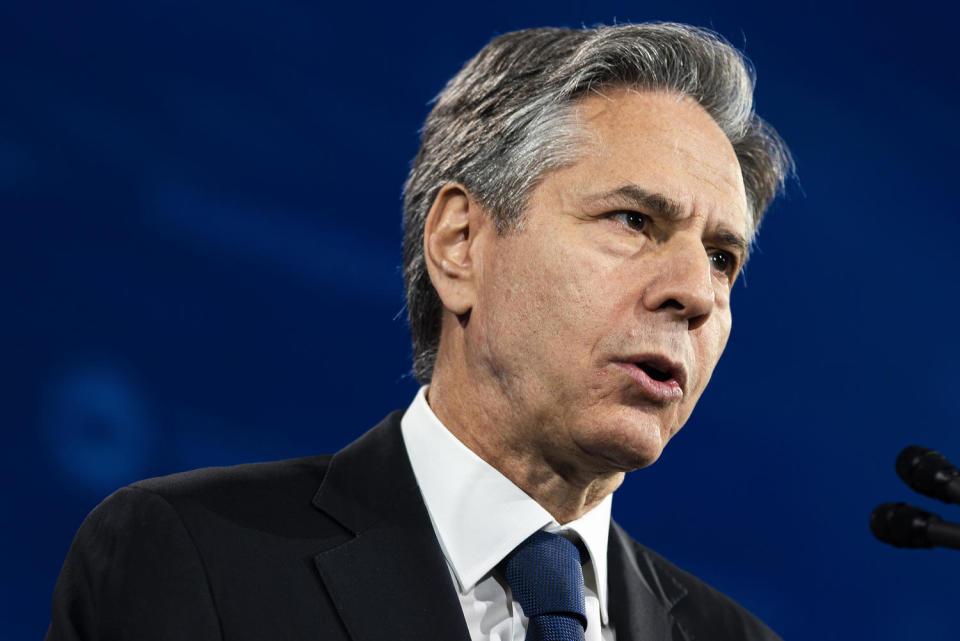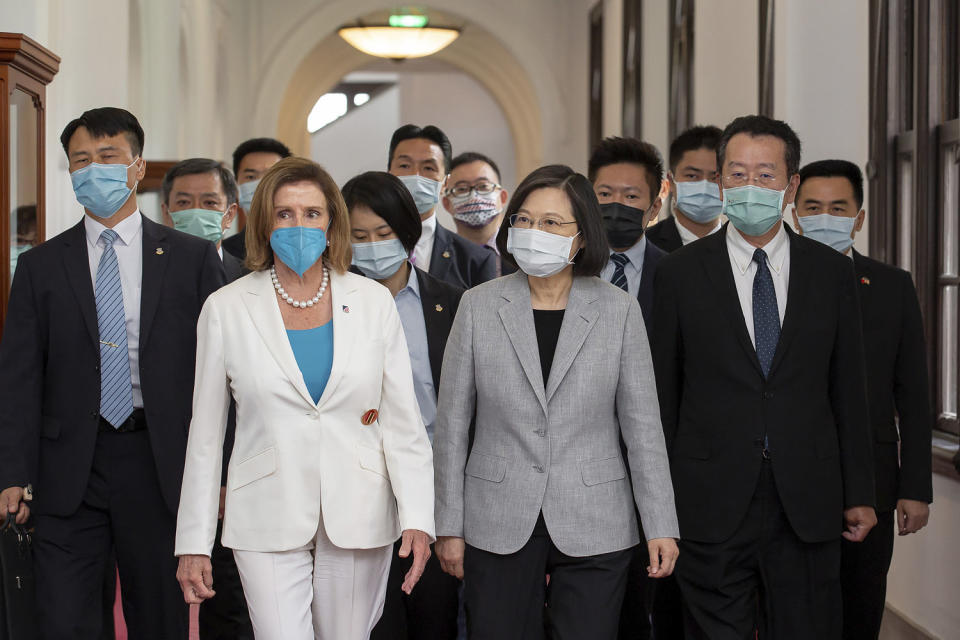A balloon just blew U.S.-China diplomacy off course
- Oops!Something went wrong.Please try again later.
- Oops!Something went wrong.Please try again later.
HONG KONG — Secretary of State Antony Blinken’s bid to slow the downward spiral in relations between the world’s two largest economies has been blown off course by a Chinese balloon.
The United States’ top diplomat on Friday postponed his high-stakes trip to China next week, two U.S. officials told NBC News, as the incident surrounding a suspected spy balloon hovering over the U.S. further complicated ties between the two countries.
The planned visit was already beset by major issues and preceded by a pair of announcements aimed at bolstering Washington’s efforts to counter Beijing abroad. But the news late Thursday that the U.S. military was monitoring a suspected Chinese spy balloon in U.S. airspace only added to the list of potential flashpoints.
China's Ministry of Foreign Affairs said in a statement Friday that the balloon was a "civilian airship" used mainly for weather research, which had been blown off course. China said it regretted its "unintended entry" into foreign airspace and would continue to communicate with American officials.

Blinken, who was expected to meet with Foreign Minister Qin Gang and possibly President Xi Jinping during his planned two-day visit, would have been the first U.S. secretary of state to visit China since Mike Pompeo in 2018.
Expectations for the trip had already been low. No breakthroughs were expected on major issues like Taiwan, trade or human rights, with experts saying the main objective was simply to prevent the U.S.-China relationship from deteriorating further.
“Both leaders need to show that the relationship is being managed and it isn’t just spinning out of control,” Ian Johnson, a senior fellow at the Council on Foreign Relations, told NBC News prior to the trip's postponement.
Mutual distrust
The balloon is only the latest development weighing on U.S.-China relations, with others including tensions over Taiwan, close encounters in the South China Sea, U.S. regulatory moves against Chinese tech companies, an increasingly hawkish U.S. Congress and an Air Force general’s prediction of war with China in 2025.
In an effort to counter China’s growing power in Asia, the U.S. has been expanding its military and diplomatic presence in the region: strengthening security cooperation with South Korea and Japan, gaining access to additional bases in the Philippines and opening an embassy in the Solomon Islands for the first time in 30 years.
Beijing says Washington’s enhanced military deployments “escalate tensions and endanger peace and stability in the region.”
U.S.-China relations reached a new low in August when then-House Speaker Nancy Pelosi visited Taiwan, a self-ruling island democracy that Beijing claims as its territory. China responded with live-fire military drills that surrounded the island.

President Joe Biden and Xi met in person for the first time in November, signaling the potential for improvement in what is often described as the world’s most important bilateral relationship. The two leaders pledged to strengthen communication between their countries and agreed on Blinken’s China visit.
One goal of the trip was to resume talks on climate change and military relations that China suspended after Pelosi’s Taiwan visit, White House National Security Council spokesperson John Kirby said at a news briefing this week. Blinken was also expected to raise the war in Ukraine and U.S. concerns about China’s “no limits” partnership with Russia.
Wu Xinbo, dean of the Institute of International Studies at Fudan University in Shanghai, said one of the biggest problems in the relationship is a mutual lack of trust. The Chinese government “thinks that the U.S. contains and suppresses China,” he said, while the U.S. government “thinks that China wants to challenge U.S. leadership.”
After three years of pandemic isolation, China is eager to kickstart its economy. To that end, Xi has been on a diplomatic charm offensive, meeting with more than two dozen world leaders at home and abroad. The recent reassignment of Zhao Lijian, a former “wolf warrior” spokesperson for the foreign ministry, has also been seen as a sign of softening.
The conciliatory tone has been reflected in Chinese state media, where a commentary on Wednesday in People’s Daily, the official newspaper of the ruling Chinese Communist Party, said China and the U.S. “should strive to make the list of cooperation longer and longer, not shorter and shorter.”
But the mood toward China in Washington is increasingly hostile, said Gao Zhikai, vice president of the Beijing-based Center for China and Globalization, expanding from former President Donald Trump’s tariffs to “all kinds of anti-China initiatives,” with a focus on Taiwan.
“I’m very pessimistic about U.S.-China relations, at least in the short term,” Gao said.
And that was before the news of the balloon, which appeared high above Montana after flying over the Aleutian Islands and through Canada.
U.S. officials said the balloon did not pose a threat to civil aviation and was of limited use in collecting intelligence, though Montana is home to one of America’s three nuclear missile silo fields at Malmstrom Air Force Base.
Taiwan timelines
U.S.-China tensions, particularly over Taiwan, have spurred fears of armed conflict between the two superpowers. In a memo leaked to the media last week, Air Force Gen. Mike Minihan said his “gut” told him the U.S. would be at war with China in 2025, comments the Pentagon said were “not representative of the department’s view on China.”
Experts point out that military officials have a budgetary incentive to suggest war is at hand, with some criticizing Minihan’s comments as overblown and potentially dangerous.
“I think we are seemingly trying to talk ourselves into a conflict that doesn’t need to occur,” Scott Kennedy, a China expert at the Center for Strategic and International Studies in Washington, said at a briefing this week.
Minihan’s 2025 prediction is just one of several that have been put forward by senior U.S. officials. CIA director William Burns told an event at Georgetown University in Washington on Thursday that the U.S. knew “as a matter of intelligence” that Xi had ordered his military to be ready for a Taiwan invasion by 2027, though Burns said that didn’t necessarily mean that’s when it would happen.
Defense Secretary Lloyd Austin said in January that he seriously doubted a Chinese invasion of Taiwan was imminent.
The varying timelines being floated undermine the credibility of U.S. messaging on Taiwan, said Jude Blanchette, a China expert at CSIS.
“What we’re effectively signaling is we have no idea, and I’m not sure we understand just how damaging that is,” he said at the briefing.
Though China has not laid out any timeline of its own, it has kept up the pressure on Taiwan since Pelosi’s visit, sending warplanes toward the island almost daily. The planes are also crossing the median line, an unofficial boundary in the Taiwan Strait, far more frequently than in the past.
China has accused the U.S. of “hollowing out” its one-China policy, whereby Washington recognizes Beijing as the only legitimate government of China and has only unofficial relations with Taiwan. Beijing views visits like Pelosi’s as support for Taiwan’s formal independence, and it is likely to respond aggressively to any visit by her successor, House Speaker Kevin McCarthy, who has said he would like to visit Taiwan as well.
The U.S. is “constantly challenging China’s bottom line” on the Taiwan issue, said Wu.
Michael O’Hanlon, director of research in foreign policy at the Brookings Institution, said the Biden administration should reassure China of its commitment to the one-China policy, while China should reaffirm that it has no intention of attacking Taiwan militarily.
“We’ve just got to avoid this war that some people seem to think is so likely,” he said, “and get things back to the kind of relationship where we have a lot of disagreements, but also some areas of cooperation and a more businesslike tone.”
Jennifer Jett and Larissa Gao reported from Hong Kong, and Megan Lebowitz reported from Washington.
This article was originally published on NBCNews.com
